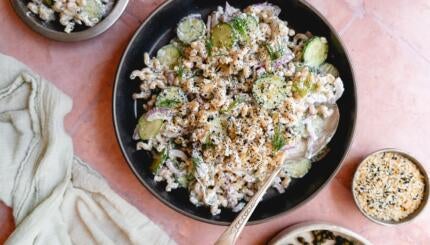What is the best way to usher in the Passover season? Not with handwringing and housecleaning, but with celebration, blessing and sweet joy!
When is Passover 2017? Click here to find out!
On Rosh Hodesh, the first day of Nisan, the Jewish month during which we celebrate Passover, Jews from Tunisia and Libya partake in a ritual called “Bsisa” or “El Bsisa.” The ritual serves as a bridge between the holidays of Purim and Passover and takes place entirely in the home. The ritual is centered around a dish called the “Bsisa” which is made in a deep bowl and is filled wheat, barley, dried fruits, honey, olive oil and other sweets. Since in the biblical narrative, Rosh Hodesh Nisan is the culmination of the building of the Mishkan, the holy tabernacle in the desert, the dish is meant to replicate what Moses made in celebration of completing the building of the Mishkan.
READ: North African Jewish Cuisine
The ritual differs from community to community in Tunisia and Libya, but according to those who remember celebrating the custom in those countries there are a number of important features. In all communities the focal point of the ritual was the turning of a key in the Bsisa mixture while a blessing in Arabic was recited (see translation below). In addition to the traditional formulaic blessing, it was common for the mother of the family to offer additional blessings. In some communities it was common to lock the doors of the home from sundown until the next morning and not allow any members of the house to leave. In others, women took off their gold necklaces and bracelets and placed them in the “Bsisa” to symbolize the gold that women donated to the building of the temple. (We have included a guide to performing the Bsisa below). What is clear throughout these various customs is the mirroring or replicating function that the Bsisa played in offering the celebration of the building of the Mishkan and the Temple to be understood on the level of each individual home.
READ: Discovering the Libyan Jewish Food of Rome
The role of the mother of the family cannot be understated in this ritual. In many communities the preparations for Passover were incredibly time consuming and intensive. In Tunisia and Libya, Jews would begin making matzah immediately after Purim and the entire community would join together in preparing for the holiday. Amidst these intense preparations, the Bsisa would mark the high point in the work leading up to Passover. It is clear that not only did women lead these preparations but they also did so with great intention and leadership.
This leadership is evident in many of the roles women hold during the Bsisa ceremony to this day. Some women lead the blessings given to each family member before they use the key to blend the grains and spices of the Bsisa mixture. Haya Ne’eman, a Tunisian educator, educational program developer and therapist based in Jerusalem, explains that “My mother knows how to bless each person in the family according to their wants and needs. This is her role in the Bsisa ceremony.” Ne’eman also said that after the Bsisa ceremony, her family enjoys delicious helpings of couscous, the last couscous before the Passover holiday. “When we were younger, the couscous was served on a large communal plate that we all ate from. This emphasized the unity of the family as we entered the month of Nissan”.
The unique role of women in leading this ritual has its roots in a foundational belief in the North African Jewish community. Harkening back to the story of our redemption from Egypt, Harav Eliyahu Bakshi Doron, the former Sephardic chief rabbi of Israel explains a rabbinic commentary from Leviticus Rabba that says that the people of Israel were redeemed from Egypt, because they preserved their names and language.
He elaborates, “In Egypt, the people of Israel still did not have a Halachic (Jewish law) framework that spelled out clearly the laws of Jewish life and the Torah of the fathers was forgotten as sons assimilated and learned the ways of the Egyptians. What kept the People of Israel special and separate? What prevented assimilation and for this reason, the People were redeemed? Not because of the father’s Musar (moral teachings), but because of the MOTHER’s torah…the mother’s language that she spoke with her sons and the special traditions that they observed separated them from the other nations and kept them distinct and for this reason, they were redeemed…”
As we begin the month of Nissan and the Passover season is upon us, let us honor and celebrate our “Mother’s Torah”. Try your own Bsisa ceremony or think about other inspiring traditions taught to you by your mother….
Bsisa Instructions and Translation
Ingredients: 2 cups Barley (cooked), ½ cup wheat berries (cooked), date honey, almonds, dried fruit (dates, figs etc), fennel seeds, coriander, additional sweets, candies and olive oil.
It is also traditional for women in the family to place gold jewelry in the Bsisa mix in memory of the gold that women donated to building of the Mishkan.
Place all ingredients in a deep dish or bowl and mix them slightly- additional mixing will happen later.
- All family members place a finger (does not matter which finger it is) over the center of the bowl
- The head of the household (traditionally the mother) holds the key to the home in her right hand and turns it in the Bsisa In her left hand she holds a bottle of olive oil
- The head of the household pours the olive oil into the Bsisa while mixing with the oil and ensures that the oil covers the fingers of each members of the house. The blessing for the Bsisa is recited and any general blessings that the mother has for the household are included.
- Each member of the family then takes the key and individually turns the key in the Bsisa mix. The key can be used as a spoon as well. While the member of the family turns the key they recite the Bsisa The mother of the family then adds additional individual blessings for each individual.
Tip: Benyamin Fennesh, the founder of Mechon Shaarei Zvulun a Tunisian Heritage organization in Israel, suggests that it is very tasty to put the leftover Bsisa in a hollowed out date.
Bsisa Blessing
יַא פַתַח בְּלַא מַפְתַח
Ya Ftach Ble Miftach You, who opens without a key
יַא עַטַאי בְּלַא מַנַא
Ya Atai Ble Mna You, who gives without any donation
אֻרְזֻקְנַה וַרְזֻק מִנַּה
Arzekna Varzook Mina Give (success) to us and to others
וַרְזֻק לְעַבֵּיד לְכֻּלֻלְנַה
Varzook LeAbeid LeKoololina And give to all of us the believers
At the end of the ceremony some families read the verses from the Torah describing the completion of the Mishkan in Parashat Pekudei Exodus 38-40.
(Photo of Bsisa at Mimizrach Shemesh a Sephardic Beit Midrash in Jerusalem.)
Midrash
Pronounced: MIDD-rash, Origin: Hebrew, the process of interpretation by which the rabbis filled in “gaps” found in the Torah.
Nisan
Pronounced: nee-SAHN, Origin: Hebrew, Jewish month, usually coinciding with March-April.
Purim
Pronounced: PUR-im, the Feast of Lots, Origin: Hebrew, a joyous holiday that recounts the saving of the Jews from a threatened massacre during the Persian period.
Sephardic
Pronounced: seh-FAR-dik, Origin: Hebrew, describing Jews descending from the Jews of Spain.
Torah
Pronunced: TORE-uh, Origin: Hebrew, the Five Books of Moses.



